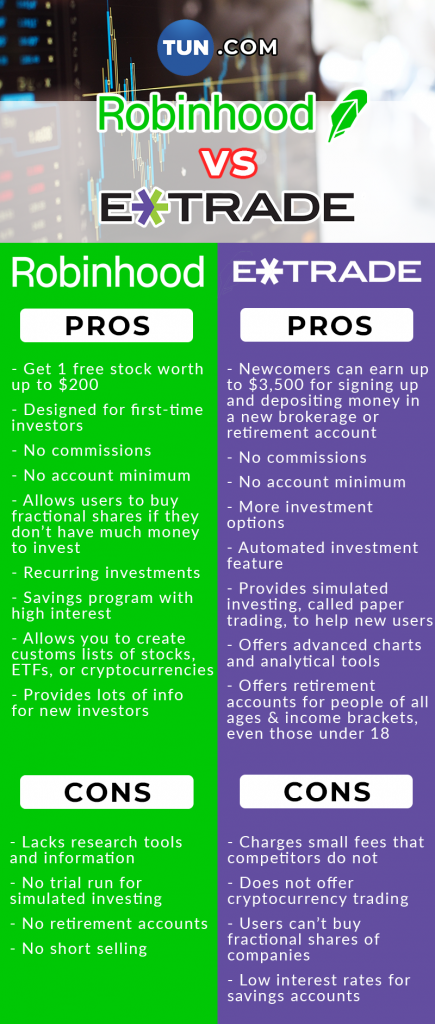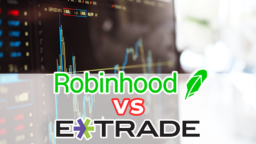There are tons of online stock trading and investing brokers out there. The hard part is choosing which option is right for you. Currently, two of the more popular online brokers are Robinhood and E-Trade, which have $0 account minimums and allow users to invest and make trades commission-free.
This article breaks down the two platforms, lists the general pros and cons of each, and will help you decide which is right for you.
E-Trade Overview
Having facilitated its first online trade in 1982, E-Trade is the grandfather of online trading and investing. E-Trade offers trades on stocks, ETFs, mutual funds, bonds, options, and futures, making it a good option for many different types of investors. Its extensive library of information and digital tools will impress seasoned investors, while its interface is simple enough for beginners to understand.
General E-Trade pros
- Sign-up bonus: E-Trade offers newcomers the chance to earn up to $3,500 for signing up and depositing money in a new brokerage or retirement account. However, unless you have a lot of money to deposit, you likely won’t receive that much. The rewards are on a sliding scale. Those who deposit less than $5,000 in their account will receive no bonus money from E-Trade, while only those who deposit $1,000,000 get the full $3,500.
- No commissions on stocks and ETFs: E-Trade does not charge commissions for stock or ETF trades, which is a good perk. However, they do charge a slight fee of $0.50 to $0.65 for options contracts, which is something other brokers, including Robinhood, do not.
- No account minimum: E-Trade does not have an account minimum, which is a great feature for those who are new to investing. It doesn’t matter how much money you have in your account as long as you have enough to buy the stock(s) you’re interested in.
- More investment options: In addition to stocks, ETFs, and options, E-Trade also lets its users diversify their portfolios by investing in bonds, futures, and mutual funds, which is something that other online brokers, including Robinhood, do not. There are small fees attached to trading these assets, however.
- Automated investment feature: E-Trade offers all the bells and whistles to help active investors make smart, informed decisions. However, for those who would prefer to have their investments managed for them, E-Trade also offers an automated investment feature to help users achieve their long-term investment goals. However, there is a $500 account minimum qualification for the automated investment feature, and E-Trade charges a 0.30% advisory fee.
- Paper trading: E-Trade offers simulated investing, called paper trading, to help new users get used to trading. Each new user is offered virtual money, which they can use to make mock investments.
- Charts and tools: E-Trade offers tons of advanced charts and analytical tools to help active traders stay up to date and make informed trading decisions.
- Retirement accounts: E-Trade offers a wide range of retirement accounts suitable for people of all age groups and income brackets. E-Trade even offers a retirement account for minors under the age of 18.
General E-Trade cons
- More fees: E-Trade charges some small fees that its competitors do not. For example, E-Trade options contracts typically cost $0.65 per contract and cost $0.50 per contract for those who place 30 or more trades per quarter. Additionally, E-Trade’s futures contracts cost $1.50 each. However, it is worth noting that futures contracts aren’t even available on Robinhood or many other popular online brokers.
- No cryptocurrency: Although there have been rumors about adding it, E-Trade does not currently offer cryptocurrency trading.
- No fractional shares: E-Trade users cannot buy fractional shares of companies. Shares of some companies, like Amazon, cost thousands of dollars each. Fractional shares make it possible for those who don’t have a lot of money to invest in companies with expensive shares.
- Savings account is underwhelming: E-Trade does offer a savings account with interest rates that are better than those offered by most standard banks. However, when compared to other trading platforms, E-Trade’s interest rate is underwhelming. Robinhood, for example, offers 0.30% interest on money stored in its Cash Management program, while E-Trade only offers an interest rate of 0.05% on money in its Premium Savings Account program.
Robinhood Overview
Founded in 2013 with the motto “investing for everyone,” Robinhood markets itself to young people who are new to investing by offering a straightforward trading platform full of the tools and features that make investing easy. With Robinhood, investors can make unlimited commission-free trades in stocks, ETFs, options, and cryptocurrency. To make things even more convenient for new investors, Robinhood has a $0 account minimum and now offers fractional trading.
General Robinhood pros
- Sign-on bonus: Robinhood gives all newcomers a free stock that is chosen randomly from its inventory. Stocks range in value from a few bucks to a few hundred dollars.
- Usability: Designed for first-time investors, the Robinhood desktop and mobile platforms are extremely easy to use. Once you have an account, investing and keeping track of your investments is intuitive.
- No commissions: Robinhood does not charge commissions for stock, options, ETFs, or cryptocurrency investing. While this used to set Robinhood apart from the competition, the company is no longer the only free trading platform available.
- No account minimum: Robinhood doesn’t have an account minimum. Users only need to have enough money in their accounts to buy the stock(s) they’re interested in.
- Fractional shares: Fractional shares are yet another feature that Robinhood offers that benefits young people who may not have all that much money to invest. Instead of buying an entire share, users can buy fractional shares that cost as little as $1.
- Recurring investments: Recurring investments is a great feature for those who want to take a hands-off approach to investing. With recurring investments, you can choose an amount and frequency at which you want to invest and Robinhood automatically purchases shares for you.
- Savings program with high interest: Robinhood users can earn high interest on their uninvested cash. Uninvested cash is the money that you have sitting in your account that you plan to invest but have not spent yet.
When you opt to participate in Robinhood’s Cash Management program, your money will be swept to program banks and earn 0.30% interest. For comparison, a Chase savings account has an interest rate of 0.01%.
- Lists: Robinhood allows you to create custom lists of stocks, ETFs, or cryptocurrencies that you’d like to follow. You can also set up alerts so that you know when there is a significant price change or any other news surrounding any of your investments.
- Investing 101: Robinhood provides a lot of information to help new investors learn the basics. On its website and in the app, users can learn the answer to all sorts of elementary questions, including “What is an investment?” and “What is the stock market?”
General Robinhood cons
- Lack of information: Compared to E-Trade, Robinhood’s basic package lacks research tools and information, which can be dissatisfying for advanced investors. But, users can upgrade to Robinhood Gold for $5 dollars a month to receive access to multiple premium features, including research from Morningstar, Nasdaq, and Nasdaq TotalView.
- No paper trading: Robinhood does not offer users a trial run using simulated money, so users have to jump straight into real-world investing.
- No retirement accounts: Robinhood does not offer any retirement program. This is just another piece of evidence that suggests Robinhood is targeting the younger investor.
- No short selling: Robinhood does not offer short selling, so users can’t bet on the decline of a stock. Although short selling can be rewarding, it can be very risky, particularly for inexperienced investors.

Robinhood vs E-Trade: Level of investing experience
Overall, Robinhood’s mobile app is known to be the most bare-bones, intuitive investment platform out there, making it a good option for beginners who want to keep their portfolios simple. E-Trade, on the other hand, offers more detailed information, trading opportunities, and features, making it a good choice for the experienced investor or the well-informed and active beginner.
That said, E-Trade does offer simulated investing, also known as paper trading, to help users with little experience become more comfortable with investing. This feature is undoubtedly valuable for new investors. For that reason, it may be beneficial to download both investment apps, navigate through the apps, and choose which is right for you.
Robinhood vs E-Trade: Starting money
While neither broker has an account minimum requirement, those with less cash in their pockets may be more comfortable starting an account with Robinhood. There are a couple of reasons why that is.
First, Robinhood offers fractional trading. This helps investors who may not have that much money buy portions of expensive shares. Fractional shares are essentially a way to democratize trading.
Second, E-Trade has a number of small fees that can sneak in and start to add up. For example, in addition to charging fees on some trades, E-Trade charges its clients to use its automated investing feature, while Robinhood’s is free.
Conclusion
E-Trade is known for its advanced charts and features, extensive trading opportunities, and impressive retirement accounts, while Robinhood is known for being cheap and simple.
Think of E-Trade as a big family home and of Robinhood as a one-bedroom apartment. If you want both the benefits and responsibilities attached to extra bedrooms, a yard, and a big kitchen, go for the house. If you’re comfortable with something small and easy to manage, go for the apartment.
Note: Check here our Webull vs Robinhood article.



